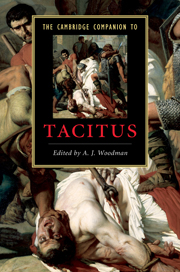Book contents
- Frontmatter
- Introduction
- Part I Contexts
- Part II Texts
- Part III Topics
- Part IV Transmission
- 16 From manuscript to print
- 17 Tacitus and political thought in early modern Europe, c. 1530-c. 1640
- 18 Gibbon and Tacitus
- 19 A dangerous book: the reception of the Germania
- 20 Tacitus and the twentieth-century novel
- 21 Tacitus’ Syme
- Chronological table
- Abbreviations and bibliography
- Index
21 - Tacitus’ Syme
from Part IV - Transmission
Published online by Cambridge University Press: 28 March 2010
- Frontmatter
- Introduction
- Part I Contexts
- Part II Texts
- Part III Topics
- Part IV Transmission
- 16 From manuscript to print
- 17 Tacitus and political thought in early modern Europe, c. 1530-c. 1640
- 18 Gibbon and Tacitus
- 19 A dangerous book: the reception of the Germania
- 20 Tacitus and the twentieth-century novel
- 21 Tacitus’ Syme
- Chronological table
- Abbreviations and bibliography
- Index
Summary
Only two ancient historians, Tacitus and Thucydides, have had a direct and enduring influence on how modern historians understand and write history. While Tacitus does not enjoy the status of Thucydides as required reading still in philosophy and politics courses, his influence is clearly evident on the two greatest historians of imperial Rome, Edward Gibbon and Sir Ronald Syme. Indeed, it is this triumvirate of an ancient, early modern and modern historian that is responsible for the prevalent pessimistic view that, for all its achievements in so many realms, Rome under the emperors was an environment of ambition, deceit and violence. Syme (1903-89) was a New Zealander but from the age of twenty-two Oxford was his home, first as an undergraduate at Oriel College (1925-7), then from 1929 as Fellow of Trinity College. He moved to Brasenose College in 1949 when elected Camden Professor of Ancient History, was knighted in 1959 and, upon his retirement in 1970, was elected a Fellow of Wolfson College. In 1976 he was appointed to the Order of Merit, one of the highest honours bestowed by the monarch in the United Kingdom and restricted to twenty-four members at any one time. The author of more than a dozen scholarly books and over two hundred articles and essays on the history, historiography and prosopography of Rome, Syme, along with Theodor Mommsen, is generally recognised as one of the two greatest Roman historians of the modern era.
- Type
- Chapter
- Information
- The Cambridge Companion to Tacitus , pp. 317 - 329Publisher: Cambridge University PressPrint publication year: 2010
- 2
- Cited by

